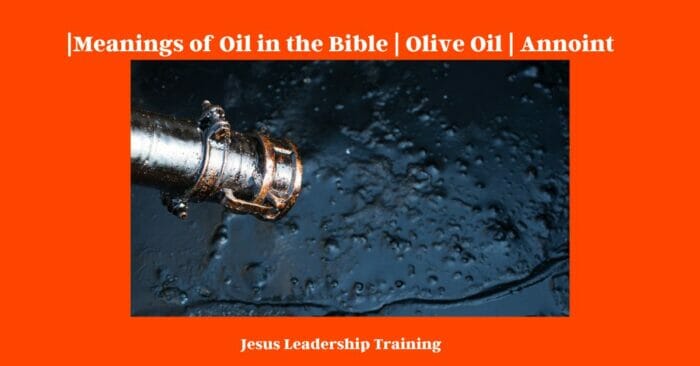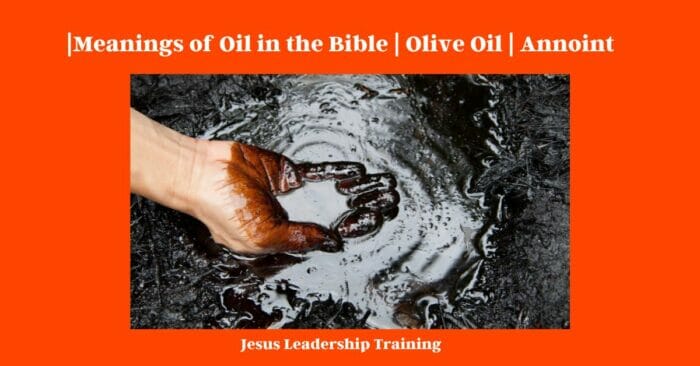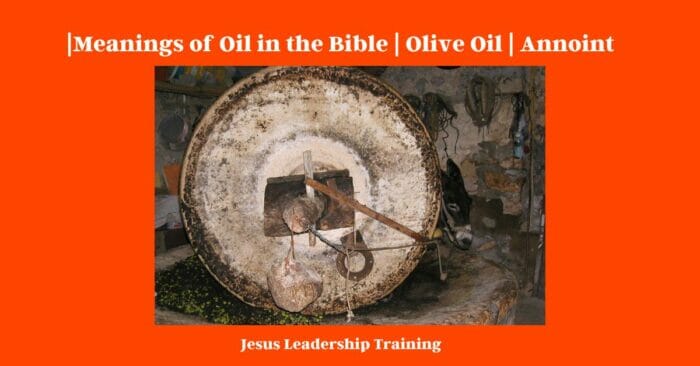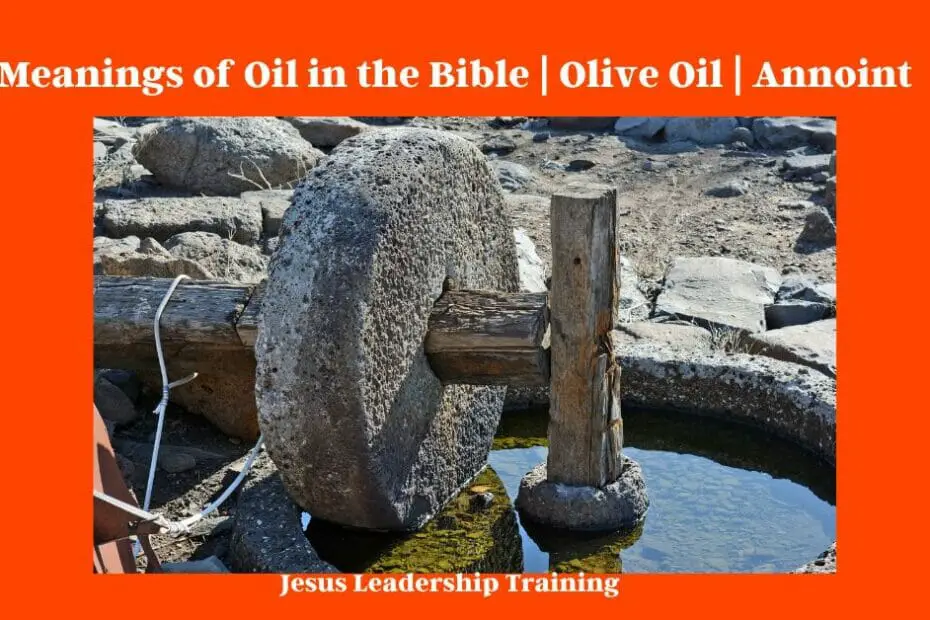Meanings of Oil in the Bible – In the Bible, oil is often used as a symbol of God’s blessing and presence. In the Old Testament, for example, oil was used to consecrate priests and kings, heal the sick, and bless homes. In the New Testament, Jesus himself is anointed with oil at his baptism. The meaning of oil in the Bible can vary depending on its context, but it generally symbolizes purity, healing, and strength.
Table of Contents
Meanings of Oil in the Bible
Oil is mentioned throughout the Bible, often in connection with anointing. In the Old Testament, oil was used to anoint priests, prophets, and kings (Exodus 29:7; 1 Samuel 10:1; 16:13).
This act of anointing symbolized the Holy Spirit coming upon these individuals and enduing them with power for their service to God. Oil was also used in the ceremonial cleansing of lepers (Leviticus 14:18) and in the preparation of certain sacrifices (Exodus 29:2, 40).
In addition to these uses, oil was a valuable commodity in the ancient world. It was used for cooking, lighting, and medicinal purposes. The olive tree was so important to the culture and economy of Israel that it was included in their list of crops that were not to be harvested during the seventh year of rest (Leviticus 25:4).
Throughout the Bible, then, oil is seen as having both spiritual and practical significance. It is a symbol of the Holy Spirit and a reminder of God’s faithfulness. It is also a valuable commodity that plays an important role in the everyday life of God’s people.

How was Olive Oil Produced?
Ancient societies considered olive oil to be a very valuable commodity. It was used as a fuel for lamps, as a base for perfumes, and even as an anointing oil for sacred ceremonies. The production of olive oil was a labor-intensive process that required the use of millstones to crush the olives and press out their juice.
The resulting oil was then collected in jars and left to settle. Over time, the oil would rise to the top and could be skimmed off for use. Although the production of olive oil has become more efficient over time, the basic process remains essentially the same. As such, olive oil continues to be prized for its many uses, both practical and ceremonial.
In Bible Are There Different Grades of Olive Oil?
Extra-virgin olive oil is made from pure, cold-pressed olives, whereas regular olive oil is a blend, including both cold-pressed and processed oils.
Bible scholars are quick to point out that in the scriptures, there are references to different grades of olive oil. In the book of Leviticus, for example, instructions are given for creating a holy anointing oil using only the finest ingredients:
“Take mythological root and acacia wood and gum resins and myrrh ointments and pistachio nuts and pure frankincense; all these shall be finely ground.
And you shall produce of it an ointment compounded after the art of perfumery; it shall be a holy anointing oil.” ( Exodus 30:23-25) This suggests that there was a understanding in biblical times that not all olive oils are created equal.
It seems likely that when Jesus pronounced that “the kingdom of heaven is like unto leaven, which a woman took, and hid in three measures of meal, till the whole was leavened” (Matthew 13:33), he was referring to the fact that even a small amount of high-quality olive oil can have a profound effect. In other words, when it comes to olive oil, as with many things in life, it’s quality not quantity that counts.
Why Was Olive Oil So Important in the Old Testament?
In the Old Testament, olive oil was used for a variety of purposes, including cooking, medicine, anointing, and lighting. It was also a valuable trade commodity.
The olive tree was so important to the people of the time that it was often used as a symbol of fertility, peace, and hope. The fruit of the olive tree was mentioned numerous times in the Bible, and it was clearly a staple in the diet of many ancient peoples.
Olive oil was also used in religious ceremonies and rituals. It was used to anoint priests and kings, and it played an important role in the Temple service. In addition, olive oil was frequently used as a metaphor for the Holy Spirit.
Clearly, olive oil was a vital part of life in the Old Testament world, and it continues to be an important part of the Christian faith today.
In Old Testament Times the Kings of Israel were anointed by the prophet Samuel using a flask of oil in the presence of his brothers to be Kings.
Significance of oil Religiously in the Old Testament.
In the Old Testament, oil was a very important and symbolic part of religious ceremonies. It was used to anoint priests, kings and prophets. It was also used in sacrificial offerings. Oil was seen as a symbol of purity and holiness, and it was believed to have power to cleanse and sanctify people.
In the New Testament, oil is also significant. In the story of the woman with the issue of blood, Jesus heals her by saying, “Your faith has made you well.” (Mark 5:34). Again, oil is seen as having power to heal. In the sacrament of baptism, oil is used to consecrate and sanctify the person being baptized.
Oil is also used in the sacrament of confirmation. In this sacrament, oil is seen as a symbol of the Holy Spirit, which comes upon the person being confirmed to give them strength and courage. Oil is a powerful symbol in both the Old and New Testaments, and it continues to be used in religious ceremonies today.
The use of oil in the consecration of the Tabernacle and the High Priest.
The use of oil in the consecration of the Tabernacle and the High Priest is a practice that has its roots in the Old Testament. When Moses was instructed by God to build the Tabernacle, he was also told to anoint it with oil.
This oil represented the Holy Spirit, and it was used to set apart the Tabernacle as a place where God would dwell. In a similar fashion, when Aaron and his sons were appointed as the first High Priests, they were also anointed with oil. Once again, this oil represented the Holy Spirit, and it was used to set them apart for their sacred duties.
The use of oil in the consecration of these two institutions was a way of signifying their importance and setting them apart for God’s purposes.

How is Oil as a symbol of holiness and consecration in the New Testament?
In the New Testament, oil is mentioned in several instances where it is used as a symbol of holiness and consecration. In Matthew, Jesus anoints his disciples with oil, saying “You have an anointing from the Holy One” (Matthew 6:20).
This act not only symbolized their status as Christ’s disciples but also their commissioning for ministry. In addition, oil was used in the consecration of priests and prophets (Exodus 29:7, 1 Kings 19:16). In each case, oil was seen as a sign of God’s presence and power.
It is clear that oil was viewed as a sacred substance in the New Testament era, and it continues to be used in many Christian traditions today. While its symbolic meaning may have changed over time, oil remains a powerful reminder of God’s presence and power in our lives.
The Elders of the Church are told to take sacred anointing oil in the name of the lord and the prayer of Faith will heal sick people.
It implies that the work of the Holy Spirit using fresh oil in the name of Jesus of Nazareth will help the sick.
The spiritual significance of essential oils in biblical times.
In the New Testament, oil is used as a symbol of both healing and sanctification. In the book of James, for example, we are told to “anoint [our] heads with oil” if we are ill (James 5:14).
This is an act of faith, believing that the Lord will heal us. Oil is also used in the sacrament of baptism, where it is seen as a symbol of the Holy Spirit. In Acts 8:14-17, we read about how Simon the Sorcerer was baptized and then asked Peter to give him the power to lay his hands on people and for them to receive the Holy Spirit.
However, Peter replied that this was not something that could be bought: “Your money perish with you, because you thought that the gift of God could be purchased with money!”. Similarly, salvation cannot be bought; it is a free gift from God. Just as oil is used to anoint and sanctify objects, so we too are anointed and sanctified by the Holy Spirit when we come to faith in Jesus Christ.
How to apply biblical principles about oil to your own life.
The Bible has a lot to say about oil! In Genesis, we read about how God created the world and blessed humanity with its resources, including oil. In the book of Exodus, we see how God used oil to protect and heal the Israelites. And in the New Testament, we read about how Jesus used oil to anoint his disciples. So what does all of this mean for us today? Here are three biblical principles about oil that you can apply to your own life:
1) Oil is a gift from God. Just as God blessed the Israelites with oil, he also blessed us with this natural resource. We should be thankful for it and use it wisely.
2) Oil can be used for good. Whether it’s used for healing or protection, oil can be a force for good in our lives. We should use it to bless others.
3) Oil should be used sparingly. Although it’s a valuable resource, we shouldn’t waste it or use it excessively. We should be good stewards of this precious gift.

Final Thoughts – Meaning of Oil in the Bible
in conclusion, oil was used in the Bible
- Holy Anointing
- Anointing of the Holy Spirit
- Oil of Gladness
- Oil of Joy
- Horn of Oil
- Jesus’ feet
- Considered Finest Spices
- Bringing Good News
- Healing
- Consecration
- Food
- Lighting
It was a very Important Item in those days. The meaning of oil has not changed much over time, it is still used today in many of the same ways. It is a precious gift from God that should be used wisely.
God Bless Greg



